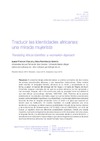Please use this identifier to cite or link to this item:
https://accedacris.ulpgc.es/jspui/handle/10553/70724
| Title: | Traducir las identidades africanas: una mirada mujerista | Other Titles: | Translating African Identities: a «womanist» Approach | Authors: | Pascua Febles, Isabel Rodríguez-García, Alba |
UNESCO Clasification: | 570112 Traducción 570107 Lengua y literatura |
Keywords: | Traducción Hibridismo Literatura poscolonial africana Mujerismo Culturemas, et al |
Issue Date: | 2019 | Journal: | Clina | Abstract: | El presente trabajo pretende realizar un análisis contrastivo de dos novelas
de autoras poscoloniales africanas y sus respectivas traducciones. Estas novelas
están escritas en lenguajes híbridos, africanos en su fondo y europeizados en su
forma, a saber: el francés del Senegal de Ken Bugul y el inglés de Nigeria de Buchi
Emecheta, lenguas coloniales de las que los autores africanos se han apropiado y
han renovado, lenguas «still in full communion with its ancestral home but altered to
suit new African surroundings» (Achebe 1965/1997, 348). Partimos de la premisa
establecida en los estudios coloniales, según la cual los textos híbridos poscoloniales
poseen particularidades lingüísticas muy específicas y numerosas referencias culturales
(muchas de ellas en lenguas vernáculas como el wolof o el igbo) que suponen un
escollo para su traducción. En nuestra hipótesis, no puede aplicarse una única
tendencia o estrategia; se deben explorar posibilidades más allá de las teorías clásicas y de la dicotomía de Schleiermacher (1813/1992) o Venuti (1995/2004), con el fin de buscar un equilibrio entre las diferentes posibilidades traslativas. Desde una mirada mujerista, ilustraremos fragmentos de estas obras con el fin de analizar cómo la cultura, el lenguaje híbrido y la identidad africana son expuestas desde un prisma femenino, y estudiaremos el tratamiento traductológico que ciertos fragmentos ilustrativos de estas escrituras femeninas africanas han experimentado hacia el español This article presents a contrastive analysis of two novels by African postcolonial female authors and their respective translations. Both novels are written in hybrid languages, African in their background and Europeanized in their form, namely: the French of Senegalese author Ken Bugul and the English of Nigerian author Buchi Emecheta. The departing point of this study is the premise established in postcolonial studies affirming that hybrid postcolonial texts have significantly specific language features and numerous cultural references (many of them in vernacular languages such as Wolof or Igbo) that represent a stumbling block to their translation practice. In our hypothesis, a single trend or strategy cannot be applied, but rather a balance between the different translational possibilities must be sought. From a womanist perspective, we will illustrate fragments of these works in order to analyse how the hybrid language and the African identity are exposed. Likewise, we will study the translational treatment that certain illustrative fragments of these African women’s writings have experienced towards Spanish. |
URI: | https://accedacris.ulpgc.es/handle/10553/70724 | ISSN: | 2444-1961 | DOI: | 10.14201/clina20195195112 | Source: | CLINA an interdisciplinary journal of translation, interpreting and intercultural communication [ISSN 2444-1961], v. 5 (1), p. 95-112 |
| Appears in Collections: | Artículos |
Page view(s)
204
checked on Oct 25, 2025
Download(s)
172
checked on Oct 25, 2025
Google ScholarTM
Check
Altmetric
Share
Export metadata
Items in accedaCRIS are protected by copyright, with all rights reserved, unless otherwise indicated.
